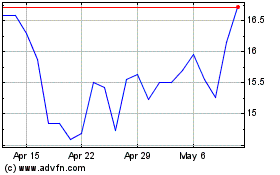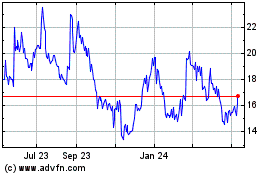Arcus Biosciences Announces Clinical Trial Collaboration Agreement to Evaluate Casdatifan in Combination with Volrustomig in Renal Cell Carcinoma
October 02 2024 - 4:05PM
Business Wire
- Arcus and AstraZeneca to evaluate their respective molecules in
combination to establish a potential first- and best-in-class
treatment for clear cell renal cell carcinoma (ccRCC)
- This is the second clinical collaboration between Arcus and
AstraZeneca
Arcus Biosciences, Inc. (NYSE:RCUS), a clinical-stage, global
biopharmaceutical company focused on developing differentiated
molecules and combination therapies for people with cancer, today
announced a clinical trial collaboration agreement with AstraZeneca
(LSE/STO/Nasdaq: AZN) to evaluate casdatifan (AB521), Arcus’s
investigational HIF-2a inhibitor, in combination with volrustomig,
AstraZeneca’s investigational PD-1/CTLA-4 bispecific antibody, in
patients with ccRCC.
“We believe casdatifan has best-in-class potential, based on the
observed PK and PD profiles and the emerging clinical data from our
ARC-20 study in patients with ccRCC,” said Terry Rosen, Ph.D.,
chief executive officer of Arcus. “This agreement will enable Arcus
and AstraZeneca to collaborate and assess the potential for the
novel combination of casdatifan with volrustomig to improve
outcomes for patients with ccRCC.”
“Renal cell carcinoma is a known CTLA-4-responsive tumor type,
and our first-in-human study with volrustomig monotherapy
demonstrated encouraging efficacy in first-line advanced ccRCC,”
said Cristian Massacesi, chief medical officer and oncology chief
development officer, AstraZeneca. “We are excited by the potential
to build on this by combining HIF-2a inhibition with volrustomig to
drive deeper and more durable responses for patients.”
As part of this collaboration, AstraZeneca will sponsor and
operationalize a study to evaluate the safety and early efficacy of
the casdatifan plus volrustomig combination in patients with
advanced ccRCC.
This is the second clinical collaboration between Arcus and
AstraZeneca. In 2020, the companies announced a clinical
collaboration for PACIFIC-8, a registrational Phase 3 study of
domvanalimab, an Fc-silent anti-TIGIT antibody, added to backbone
global standard-of-care durvalumab, an anti-PD-L1 antibody, in
patients with unresectable Stage III non-small cell lung
cancer.
Under the Gilead and Arcus collaboration agreement, Gilead has
the right to opt-in to development and commercialization for
casdatifan after Arcus’s delivery of a qualifying data package.
About Casdatifan (AB521)
Casdatifan is a small-molecule inhibitor of HIF-2a, a
transcription factor involved in oxygen sensing in multiple organs
as well as in tumors. Clear cell RCC is almost universally
associated with HIF-2a dysregulation as a result of genetic
abnormalities in the VHL pathway. This creates a situation of
pseudohypoxia and the abnormal increase in HIF-2a-mediated
expression of a wide array of proteins involved in cancer cell
proliferation and survival, treatment resistance and angiogenesis.
Casdatifan is being evaluated in ARC-20, a Phase 1/1b study in
cancer patients, and STELLAR-009, a Phase 1b/2 study in combination
with zanzalintinib in patients with advanced solid tumors,
including ccRCC.
Casdatifan and domvanalimab are investigational molecules.
Approval from any regulatory authority for any use of these
molecules globally has not been received, and their safety and
efficacy have not been established.
About RCC
According to the American Cancer Society, kidney cancer is among
the top 10 most commonly diagnosed forms of cancer among both men
and women in the U.S., and an estimated 81,600 Americans will be
diagnosed with kidney cancer in 2024. Clear cell RCC is the most
common type of kidney cancer in adults. If detected in its early
stages, the five-year survival rate for RCC is high; for patients
with advanced or late-stage metastatic RCC, however, the five-year
survival rate is only 15%. In 2022, approximately 32,200 patients
with advanced kidney cancer required systemic therapy in the U.S.,
with over 20,000 patients receiving first-line treatment.
About Arcus Biosciences
Arcus Biosciences is a clinical-stage, global biopharmaceutical
company developing differentiated molecules and combination
medicines for people with cancer. In partnership with industry
collaborators, patients and physicians around the world, Arcus is
expediting the development of first- or best-in-class medicines
against well-characterized biological targets and pathways and
studying novel, biology-driven combinations that have the potential
to help people with cancer live longer. Founded in 2015, the
company has expedited the development of multiple investigational
medicines into clinical studies, including new combination
approaches that target TIGIT, PD-1, HIF-2a, CD73, dual A2a/A2b
receptor, CD39, and AXL. For more information about Arcus
Biosciences’ clinical and preclinical programs, please visit
www.arcusbio.com.
Forward-Looking Statements
This press release contains forward-looking statements. All
statements regarding events or results to occur in the future
contained herein are forward-looking statements reflecting the
current beliefs and expectations of management made pursuant to the
safe harbor provisions of the Private Securities Litigation Reform
Act of 1995, including, but not limited to, the potential of
casdatifan alone and in combination with volrustomig. All
forward-looking statements involve known and unknown risks and
uncertainties and other important factors that may cause Arcus’s
actual results, performance or achievements to differ significantly
from those expressed or implied by the forward-looking statements.
Factors that could cause or contribute to such differences include,
but are not limited to: difficulties or delays in initiating or
conducting clinical trials due to difficulties or delays in the
regulatory process, enrolling subjects or manufacturing or
supplying product for such clinical trials; the emergence of
adverse events or other undesirable side effects; difficulties
associated with the management of the collaboration activities or
expanded clinical programs; changes in the competitive landscape
for Arcus’s programs; and the inherent uncertainty associated with
pharmaceutical product development and clinical trials. Risks and
uncertainties facing Arcus are described more fully in the “Risk
Factors” section of Arcus’s most recent Quarterly Report on Form
10Q filed with the U.S. Securities and Exchange Commission. You are
cautioned not to place undue reliance on the forward-looking
statements, which speak only as of the date of this press release.
Arcus disclaims any obligation or undertaking to update, supplement
or revise any forward-looking statements contained in this press
release except to the extent required by law. The Arcus name and
logo are trademarks of Arcus Biosciences, Inc. All other trademarks
belong to their respective owners.
View source
version on businesswire.com: https://www.businesswire.com/news/home/20240929799591/en/
Investor Inquiries: Pia Eaves
VP of Investor Relations & Strategy (617) 459-2006
peaves@arcusbio.com
Media Inquiries: Holli Kolkey VP of Corporate
Communications (650) 922-1269 hkolkey@arcusbio.com
Arcus Biosciences (NYSE:RCUS)
Historical Stock Chart
From Dec 2024 to Jan 2025

Arcus Biosciences (NYSE:RCUS)
Historical Stock Chart
From Jan 2024 to Jan 2025
